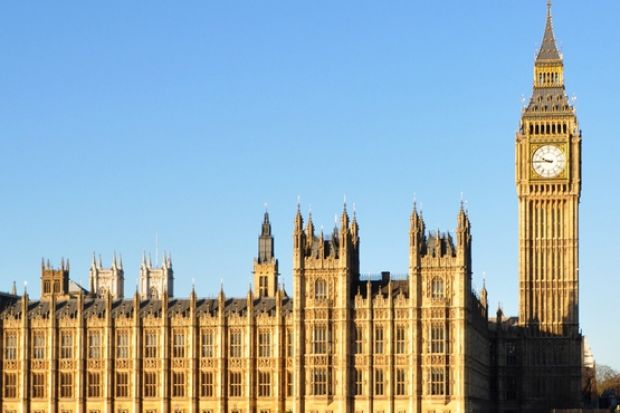The first sign that the government may be forced to make concessions on counter-terrorism legislation has emerged in response to concerns that the proposals would curb academic freedom.
Ahead of the next report stage debate for the counter-terrorism and security bill in the House of Lords, an amendment has been proposed by government spokesman Lord Bates that would, if passed, introduce a reference to universities’ obligations around free speech for the first time.
When carrying out the duty to prevent people from being drawn into terrorism, as required by the bill, colleges and universities must “have particular regard” to their responsibilities under the Education Act 1986, the amendment says.
The Thatcher-era legislation requires institutions to “take such steps as are reasonably practicable to ensure that freedom of speech within the law is secured for members, students and employees of the establishment and for visiting speakers”.
In addition, the amendment adds, the home secretary must have “particular regard” to this issue when considering whether to issue guidance or to make a direction to a university that was felt to be failing to protect people from being drawn into terrorism.
It is not clear whether the amendment will be put to the vote when peers consider the bill again on 4 February.
But it reflects concerns that the legislation, which could force universities to ban speakers with extreme views from campuses, would amount to censorship. For instance, it is feared that the bill may require the speeches of visiting speakers to be vetted in advance.
In a letter to The Guardian, published on 3 February, more than 500 professors warn that the bill is “unnecessary and ill-conceived”, and in conflict with the 1986 act.
The amendment may also reflect a fear that the government faces a potential defeat if it tries to push the bill through as it stands.
Peers who have spoken out about the impact of the bill on universities include Lady Manningham-Buller, the former director-general of MI5 and current chair of Imperial College London’s governing council.
However, an amendment to exclude universities from the statutory duty to prevent terrorism, which was tabled by cross-bencher Lord Pannick, a leading barrister, and Liberal Democrat Lord McDonald, the former director of public prosecutions, was not pushed to a vote last week.
Sally Hunt, the general secretary of the University and College Union, called on the government to rethink its position.
“There is widespread disquiet across the academic community about the government’s ill-conceived counter-terrorism and security bill and the threat it poses to free speech on campus,” she said.
“The best response to acts of terror is to retain our universities and colleges as open democratic spaces, rather than to close down debate and create mistrust between teacher and student, which is what the bill would do.”
Liberal Democrat spokeswoman Baroness Brinton welcomed a second government amendment that would require guidance relating to the bill to be put before Parliament.
“My view is that it is satisfactory…this is the bare minimum we could have accepted,” she said.
She added: “I think [ministers] realise that all sides of the House of Lords take freedom of speech very seriously and were worried that the counter-terrorism bill would contravene that – and, worse than that, would make dialogue with students who might be being radicalised even harder. The amendments today show they have heard and we are grateful for these concessions.”
Register to continue
Why register?
- Registration is free and only takes a moment
- Once registered, you can read 3 articles a month
- Sign up for our newsletter
Subscribe
Or subscribe for unlimited access to:
- Unlimited access to news, views, insights & reviews
- Digital editions
- Digital access to THE’s university and college rankings analysis
Already registered or a current subscriber? Login




